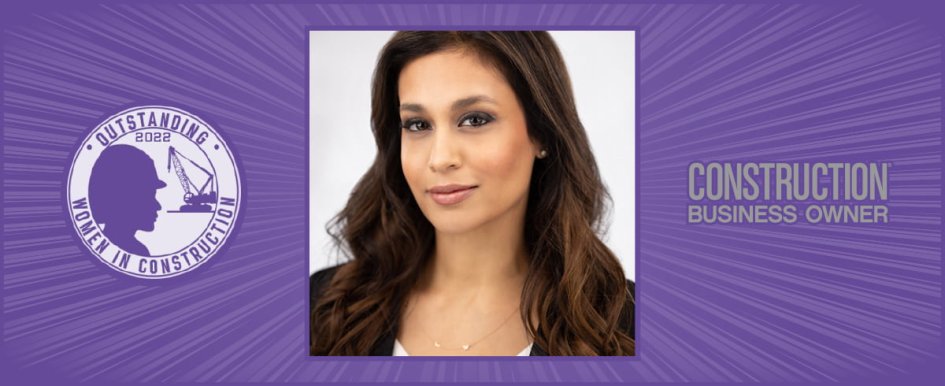
 No. 1 Must-Have: “Inner peace and confidence — because whatever I do starts within me.”
No. 1 Must-Have: “Inner peace and confidence — because whatever I do starts within me.”
In 1985, Libby Mendiratta’s father bought G.E. Frisco Company, Inc., a construction materials supplier specializing in lumber. After Mendiratta began her own professional career in information technology, her father asked her back, and she saw an opportunity to learn the family business from the man she so admired. “My father is an Indian immigrant with a master’s degree in engineering from the University of California, Berkeley, and he has always been a business owner. He imparted that entrepreneurial spirit on us,” she said. At G.E. Frisco, Mendiratta started in administration, learning the ins and outs of each facet of the company before becoming director of the minority business enterprise (MBE) division and shifting her focus to increasing the company’s number of MBE certifications for 100% Asian-owned family business. Today, G.E. Frisco is certified to bid on publicly awarded construction contracts with the Maryland Department of Transportation (DOT); Prince George’s County, Maryland; the city of Philadelphia, the City of Baltimore, Washington Metropolitan’s District DOT and Area Transit Authority; and the New Jersey DOT.
While Mendiratta continues to serve as director of the MBE division as she has for 15 years, the past five years have seen her take on a senior leadership role as executive vice president and co-owner of the company alongside her brother, who is president and CEO. “I am our people person now,” she said, and Mendiratta constantly works to improve company culture and ensure that employees are put in the right position, know their goals and have access to the proper training to achieve those goals. “Culture is a very important to me because, since we are a construction supply company, we don’t necessarily offer all of the perks or benefits packages that larger corporations provide. But, as a family-owned business, we are very mindful of our 22 employees. We treat them like family,” said Mendiratta. “I’m proud of that.”
Mendiratta is still a female in a majority-male industry, and has faced marginalization due to her gender. “I have certainly been spoken to in a manner that I don’t think is consistent with how a male would be spoken to in the same situation. I’ve encountered very rude behavior, especially from male counterparts.” But, according to her, responding on instinct is dangerous and works against the ultimate goal. It is paramount, she said, to remain confident and calm, finding a personal professional voice that lets others know they and have no basis for their dismissive or rude tone and that it won’t be tolerated. “I definitely didn’t have that confidence in my 20s, or even my 30s,” she said. “My goal is to empower young women in the industry to have that confidence,” and she puts her efforts where her goals are.
Mendiratta is the chair of the Associated Builders and Contractors (ABC) of Metro Washington’s Women Building Washington committee and a director within the National Association of Women in Construction’s (NAWIC) D.C. chapter. She is also an active member of CREW DC. But her greatest achievement in advancing women in the industry is the partnership between the Women Building Washington group of ABC Metro and NAWIC to hold their first-ever donation-funded, free, four-day construction camp for girls, hosted by Thomas Edison High School. Held in summer 2022, the camp featured a mock bid day conducted by Coakley and Williams Construction, a jobsite tour with Harkins Builders, Inc., an electrical switchboard demonstration by Helix Electric, various small building projects, and discussions on diversity and inclusion in the workplace, perseverance, and confidence. The camp will be held each summer, and Mendiratta hopes it not only gives insight to those interested in pursuing a construction career, but also intrigues girls who have never considered it.
Intriguing talented young women is crucial for solving what Mendiratta sees as one of the biggest challenges the construction industry will continue to face: labor shortages. “My answer has always been women,” she said. “If we want to begin to solve the labor shortage in the industry, we have to make females aware of the job opportunities available to them. Construction can be a viable, secure, lucrative career, and this isn’t normally taught to girls and women. But we should not settle for a seat at the table; we need to take our places at the head of the table, too.”
Mendiratta is hopeful for the future of the industry, despite the challenges it faces and the long road ahead as it pertains to diversity and inclusion. “I talk to more and more women who are actually part of the project from the very beginning to the finish,” she said, and she hopes to have a hand in increasing those numbers. “Ultimately, everything I do is for my three sons,” she says. “It’s all in the name of making them proud that their mom stood for something and paved the way for the next generation of females in the industry.”
